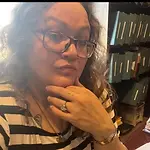The Unspoken Expectation
The Shift from Seeking Approval to Embracing Authenticity

Ever since I was little, I’ve been told to “act like a lady.” Sit properly. Speak softly. Don’t interrupt. Don’t get angry. Don’t be “too much.” It’s a phrase that seems harmless on the surface, but as I’ve grown older, I’ve realized that it carries an entire history of expectation, control, and quiet suffering—especially for women in my family. My main reason for wanting to write, to become an author, is to show myself that I don’t have to repeat that cycle of generational trauma. I refuse to keep shrinking myself to fit into an outdated mold.
Growing up, I watched the older women in my family—strong, intelligent, and resilient—spend their lives pleasing others, often at the cost of their own happiness. Their value was measured by how well they conformed to an image of “ladylike” behavior: polite, reserved, nurturing, and self-sacrificing. Meanwhile, the men around them had the freedom to express themselves however they pleased—anger, ambition, carelessness, or confidence were all acceptable. The double standard was painfully clear, and it planted a question in my mind: why do women have to work so hard to be accepted while men are simply allowed to be?
Being “ladylike” isn’t just about manners—it’s about control. It’s a quiet reminder that women should restrain themselves, prioritize others, and seek validation through how well they fit into societal expectations. This has taken a toll on the mental health of so many women, even today. We are taught to smile through discomfort, to say yes when we mean no, and to remain agreeable even when our hearts are breaking. That kind of conditioning doesn’t just disappear; it lingers in the way we think, act, and even love.
So why does this mindset persist? I think part of it comes from tradition—passed down through generations as if it’s something sacred. Religion, culture, and family often play a role in reinforcing it. There’s this idea that a “good woman” must serve, must obey, must look perfect while doing it. Emotional restraint, societal approval, and physical appearance are valued more than honesty, passion, or individuality. It’s not just unfair—it’s dehumanizing.
And then there’s internalized misogyny, which is perhaps the hardest part to confront. When women police other women, telling them to dress differently, act more modestly, or tone down their personalities, it shows how deep this cycle runs. It’s like watching a cage being rebuilt by the very people who have been trapped inside it.
But I believe things are changing, slowly. Our generation is asking questions our mothers and grandmothers couldn’t. We’re challenging the idea that our worth depends on how likable we are or how quietly we endure. We are learning that setting boundaries doesn’t make us selfish—it makes us whole.
To stop this endless cycle of oppression, we have to start with awareness. We need to talk about these expectations openly, call them what they are, and refuse to pass them on to the next generation. We have to teach young girls that being “ladylike” doesn’t mean being silent, small, or selfless—it means being true to themselves, whatever that looks like.
I don’t want to be a “lady” in the traditional sense. I want to be a woman—loud, passionate, imperfect, and free.


